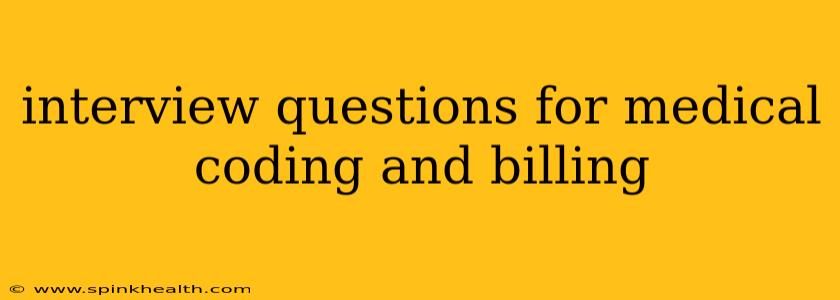Decoding the Mystery: Aceing Your Medical Coding and Billing Interview
Landing your dream job in medical coding and billing requires more than just technical skills; it demands a confident and articulate presentation of your expertise. This isn't just about knowing the codes – it's about demonstrating your understanding of the intricate dance between medical procedures, insurance regulations, and accurate financial reporting. This guide will equip you with the interview questions you need to conquer, transforming nerves into informed confidence.
Let's begin our journey with a story. Imagine Sarah, a seasoned medical coder, preparing for her interview. She knew the codes, but felt unprepared for the why behind them. This is where we'll help you stand out – not just knowing the "what," but mastering the "how" and "why."
I. Essential Foundational Questions:
These questions lay the groundwork, assessing your fundamental understanding and approach to the work.
-
Tell me about your experience in medical coding and billing. This open-ended question allows you to highlight your strengths and tailor your answer to the specific job description. Quantify your accomplishments – "Improved claim processing time by 15% by implementing a new software system," for instance, speaks volumes.
-
What coding systems are you familiar with (e.g., ICD-10, CPT, HCPCS)? This is a direct assessment of your knowledge base. Be specific, and mention your proficiency level with each system. If you have niche experience (e.g., specific procedure coding), mention it!
-
Describe your process for verifying patient insurance coverage and handling denials. This tests your understanding of the practical aspects of the job. Walk the interviewer through your steps, emphasizing accuracy and problem-solving skills. Mention any tools or techniques you've employed to streamline this process.
-
Explain your understanding of medical terminology and anatomy. Medical coding requires a strong grasp of medical language. Demonstrate your vocabulary and ability to translate medical terms into accurate codes.
II. Diving Deeper: Advanced Concepts and Problem-Solving
These questions explore your ability to handle complex scenarios and demonstrate your critical thinking skills.
-
How do you stay up-to-date with changes in coding guidelines and regulations? This showcases your commitment to professional development. Mention specific resources you utilize (e.g., professional organizations, online courses, continuing education).
-
Describe a time you had to troubleshoot a complex coding or billing issue. What was your approach, and what was the outcome? This is your chance to shine! Use the STAR method (Situation, Task, Action, Result) to structure your answer, highlighting your problem-solving skills and resilience.
-
How do you handle discrepancies between physician documentation and submitted claims? This demonstrates your understanding of accuracy and the importance of clear communication. Explain your process for clarifying ambiguities and ensuring accurate coding.
-
What is your experience with electronic health records (EHR) systems? Most healthcare facilities utilize EHRs, so your familiarity with them is crucial. Highlight your experience with specific systems and your ability to navigate them efficiently.
III. Addressing "People Also Ask" Concerns:
These are common questions found in online search results, highlighting the areas where job seekers frequently seek clarification.
-
What is the difference between ICD-10 and CPT codes? Clearly explain the purpose and function of each code set – ICD-10 for diagnoses and CPT for procedures.
-
How do you ensure compliance with HIPAA regulations? Discuss your understanding of HIPAA and the importance of patient privacy and data security. Mention specific practices you follow to maintain compliance.
-
What are some common coding errors, and how can they be avoided? Demonstrate your awareness of potential mistakes and your strategies to prevent them (e.g., double-checking codes, using coding resources).
-
What is your experience with different types of insurance payers? Explain your familiarity with different insurance plans (e.g., Medicare, Medicaid, private insurance) and your understanding of their billing requirements.
IV. Beyond the Technical: Soft Skills and Professionalism
Don't underestimate the importance of these aspects – they often make the difference between a good candidate and a great one.
-
How do you handle stress and prioritize tasks in a fast-paced environment? Medical coding and billing can be demanding. Share your strategies for managing workload and maintaining accuracy under pressure.
-
Describe your teamwork and communication skills. Highlight your ability to collaborate effectively with physicians, nurses, and other healthcare professionals.
-
Why are you interested in this specific position/company? This demonstrates your genuine interest and research. Show that you understand the company's mission and how your skills align with their needs.
By preparing answers to these questions, Sarah, and you, can confidently navigate the interview process. Remember – it's not just about knowing the answers; it's about showcasing your passion, skills, and dedication to the field. Good luck!

